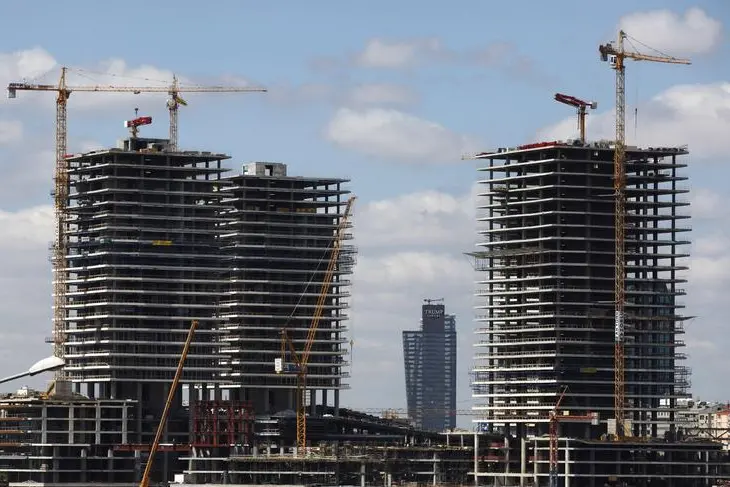PHOTO
The slump in the value of the Turkish lira could create "significant downside risks" for the country's construction sector, but this does not necessarily mean that some of the megaprojects involving Turkish contractors in the Gulf will be affected.
Fitch Solutions said in an analyst's note published last week said that the lira's depreciation "will drag on activity in the private, non-residential sector" in Turkey, for a number of reasons.
Firstly, it said there is a "heavily indebted corporate sector exposed to high levels of externally financed debt". With firms needing to commit more resources to service foreign currency-denominated debts, investment into future construction projects is likely to be lower, the note said.
It added that some infrastructure projects that have been commissioned on a public-private partnership (PPP) basis, especially those that have been financed through foreign currency loans but which receive revenues based in lira, "will face significant risks of project viability being undermined in the new currency environment".
Risks related to such schemes "will take time to materialise and will depend on the degree to which creditors are willing to refinance loans", the note said.
"Unless a project's debt is covered by a government guarantee (Istanbul's new airport is not covered, for example), then company debt servicing costs could see extreme pressure build in the sector and we could see projects cancelled, companies fold and growth slow," Fitch Solutions' note said.
The Turkish lira has fallen in value by 37 per cent against the United States Dollar so far this year, closing at 6.0550 lira per $1 on Friday.
A note distributed to media by ratings agency S&P on Sunday stated that Turkey's banking sector faces a tougher time, predicting that 'problem' loans (those classed as non-performing or debts that have had to be restructured) are already likely to be in double digits and could increase to 15 percent of total loans within two years, based on current market conditions.
It identified the energy and construction sectors as two of the biggest risks, with construction representing 10 percent of total bank loans as of March 2018.
"This sector is an important employer in Turkey and key to economic growth, accounting for about 15 percent of GDP in 2017," S&P's note said.
Yet whether the tough market faced domestically will rein in Turkish contractors' ambitions in the Gulf remains to be seen. Turkish contractors such as TAV, Limak, Tekfen, Yapi Merkeizi and Gunal have played a major role in delivering major pieces of infrastructure around the Gulf in recent years. For instance, TAV Construction is currently a joint venture partner with other contractors on major airport upgrade projects in Abu Dhabi and Bahrain, while Limak is partnering with local contractor Kharafi National on the expansion of Kuwait International Airport. Tekfen Construction is a joint venture partner with Qatar's Al Jaber Engineering on a 1.25 billion Qatari rial ($343.4 million) project to build the Al Thumama stadium - one of the new stadiums planned for Qatar's 2022 World Cup.
In an emailed response to questions from Zawya, Richard Marshall, head of infrastructure at Fitch Solutions, said that many companies operating in Turkey's contracting market "are going to be under pressure and international or non-core operations such as those outside of Turkey are often the victims when firms are looking to save money".
"That said, those international revenues (likely in dollars) are now even more valuable to the firms so we could actually see those Turkish firms and their considerable expertise double down on their international operations to boost overall revenues while the domestic market is tough," Marshall said.
David Clifton, a director of strategy & growth for Aecom's Construction Services business in the Middle East, told Zawya via email that Turkish contractors "have been quite active in the GCC" as they have been able offer alternative forms of financing for projects through government export support schemes, which have been used on projects such as the Kuwait airport expansion and the PPP airport development in Saudi Arabia to expand Madinah International Airport, which completed in 2015.
"Given potential risks to the Turkish (sovereign) credit rating and the pressure on the currency this could wane," he said in a note emailed to Zawya.
Clifton also argued that GCC countries would remain an attractive market for Turkish contractors, given that most have currencies that are pegged to the US dollar which, he said, provided greater returns for contractors when repatriating capital to Turkey, as well as making their own supply chain "much more competitive", given exchange rate differences.
Further reading:
- Erdogan says commitment of all Turks needed to combat attacks on economy
- Qatar and Turkey central banks sign swap agreement -Qatar central bank
- Lack of confidence: Declining value of Turkish lira presents challenges for country's banks
- FACTBOX- European banks' exposure to Turkey
- Kuwait's NBK, KFH sign $831mln loan for Turkey's Limak for airport project
(Reporting by Michael Fahy; Editing by Mily Chakrabarty)
(michael.fahy@thomsonreuters.com)
Our Standards: The Thomson Reuters Trust Principles
Disclaimer: This article is provided for informational purposes only. The content does not provide tax, legal or investment advice or opinion regarding the suitability, value or profitability of any particular security, portfolio or investment strategy. Read our full disclaimer policy here.
© ZAWYA 2018





















